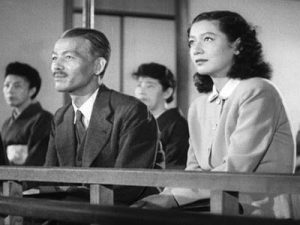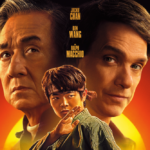The Brisbane Asia Pacific Film Festival 2016
Late Spring 1949
Directed by Yasujiro Ozu
Starring Setsuko Hara, Chishi Ryu, Haruko Sugimara
Reviewed by Michael Dalton
[rating: 5/5]
With a catalogue as diverse as any cinephile could hope for, The Brisbane Asia Pacific Film Festival opens this week with the majority of screenings at Palace Barracks and Palace Centro. Among them, and lovingly restored, are the 1954 Japanese favourite Twenty-Four Eyes by Keisuke Kinoshita, both Late Autumn and Late Spring by the esteemed Yasujiro Ozu, the Australian adventure Storm Boy by Henri Safran, and two very advance screenings of Oscar favourite Manchester by The Sea by Kenneth Lonergan (this instant classic won’t be opening wide until early next year). For now, Late Spring.
It’s hard to believe watching Ozu’s 1949 melodrama now that the censors were so disturbed by it. The story is simplicity itself, the telling is characteristic of the director’s always restrained approach, and its mood comes on like a soothing spring breeze. Yet the censors were taken aback by the narrative’s daring contention of the arranged marriage of its leading lady and a closing scene where she and her father make a pilgrimage to her mother’s grave (ancestral worship was frowned upon). They even wanted references to Gary Cooper removed until they realised they were actually flattering to the actor.
It tells the story of Noriko (the stunning Setsuko Hara), the twenty-seven year old daughter of widower Shukichi Somiya (Chishi Ryu). Happily devoted to him, she runs their middle-class household and takes care of her father’s needs, always smiling, always contented. Her Aunt Masa (Haruko Sugimara) however thinks it foolish that her niece has not yet settled into married life and broaches it with her brother who agrees. Noriko is resolutely opposed to the idea, much preferring to stay with her elderly father. Masa however is not dissuaded and resolves to play matchmaker and in Shukichi’s efforts to encourage his daughter, he tells her, much to her dismay (and quiet revulsion), he plans to marry Mrs. Miwa (Kuniko Miyake), an attractive widower.
Societal expectation was a theme Ozu would return to again and again and his critics would agree that the easy narrative lines of Late Spring (which is based on the novel Father and Daughter by Kazuo Hirotsu) set in motion the golden era of his career. Explored from opposing angles in the legendary Tokyo Story (where all the major players here would reunite) and the mischievous Ohayo, the essential need for marriage and security would gently buzz through the remainder of the director’s filmography.
Unsurprisingly Late Spring, so perfect in its perceptions of human nature, yearning, and humble resistance, is referred to as Ozu’s finest work (his 1962 swansong, An Autumn Afternoon, is a technicolour version). He had a deep respect for tradition and his characters always conducted themselves accordingly, without ever appearing stuffy or obnoxious. Hara and Ryu, who would work constantly with the director, step into their roles, and the landscape, keenly. They give the film its disarming sense of reality, and move it beyond the constraints we’re accustomed to. Their performances sing the plaintive notes so clearly that the film’s warm realism wouldn’t exist without them. They belong.
Ozu must have been enamored with his players and the synced style they have in their mutually respectful portrayals. Watch closely when Noriko quizzes her father about his marriage plans. Every question she fires at him, he nods, then again, and then again. We know it’s the most wrenching conversation of Ryu’s life, and such is Noriko’s respect, we know it’s her most painful. Ozu occasionally breaks from the increasingly emotional events to take us outside, away from the Somiya home to breathe in the surrounding vistas. Famous for his stationary camera that always looked up as if from a child’s point of view, he allows it to move more freely here than he would again. Consider the shimmering seaside bicycle ride Noriko enjoys and how his camera switches from her to her companion, framing their joy and freedom.
It is no surprise that Ozu keeps Noriko’s husband-to-be out of the picture (he would do the same in his next film Early Summer). Traditional romance wasn’t his concern. rather, his prime objective was to explore family balance and the result of it being upended. That Late Spring captures that concern so effortlessly is what makes it so sing and yet, despite the impending sacrifice, there is joy here, and its quiet, subtle, and beautiful.
http://brisbaneasiapacificfilmfestival.com




